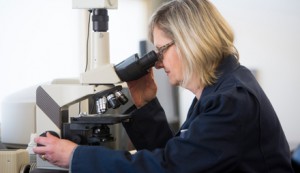 Alcohol consumption during pregnancy can increase the chances that subsequent generations may develop alcoholism, according to a new Binghamton University study.
Alcohol consumption during pregnancy can increase the chances that subsequent generations may develop alcoholism, according to a new Binghamton University study.
A research team led by Nicole Cameron, assistant professor of psychology at Binghamton, was the first to investigate the effects of alcohol consumption during pregnancy on alcohol-related behavior (consumption and sensitivity to the effect of alcohol) on generations that were not directly exposed to alcohol in the uterus during the pregnancy.
Pregnant rats received the equivalent of one glass of wine, four days in a row, at gestational days 17-20, the equivalent of the second trimester in humans. Juvenile male and female offspring were then tested for water or alcohol consumption. Adolescent males were tested for sensitivity to alcohol by injecting them with a high-alcohol dose, which made them unresponsive (drunk on their back), and measuring the time it took them to recover their senses (back on their four paws).
The results suggest that if a mother drinks during pregnancy, even just a little, she increases the risk that her progeny will become alcoholic.
“Our findings show that in the rat, when a mother consumes the equivalent of one glass of wine four times during the pregnancy, her offspring and grand-offspring, up to the third generation, show increased alcohol preference and less sensitivity to alcohol,” Cameron says. “Thus, the offspring are more likely to develop alcoholism. This paper is the first to demonstrate trans-generational effects of alcohol consumption during pregnancy on alcohol-related behavior in offspring.”
To date, no study has shown a transgenerational effect of prenatal ethanol exposure on ethanol consumption in the second or third generation. Other research into the effects of alcohol exposure during pregnancy studied the effects only on the fetuses directly exposed or the effects on cellular activity over multiple generations, but never alcohol-related behaviors over multiple generations.
Cameron and her team recently received funding from the National Institute on Alcohol Abuse and Alcoholism to continue the research on the transgenerational effects of gestational alcohol exposure.
“We now need to identify how this effect is passed through multiple generations by investigating the effects alcohol has on the genome and epigenome (molecules that control gene translation),” Cameron says.
This research was conducted in collaboration with Michael Nizhnikov of Southern Connecticut State University.
The study, “Trans-generational transmission of the effect of gestational ethanol exposure on ethanol use-related behavior,” was published Feb. 15 in Alcoholism: Clinical and Experimental Research.







